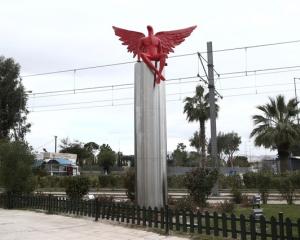
At least 14 people were arrested, authorities said, as youths clashed with riot police on-and-off for more than 10 hours and into the night, leaving the city centre filled with tear gas and strewn with smashed-up marble paving stones. Unions had begun a 48-hour strike that shut down services and staged mass rallies through the capital in another day of chaotic protest.
The new austerity measures must be passed in a two-part vote on Wednesday and Thursday if Greece's international creditors are to release the next euro12 billion batch of the country's euro110 billion bailout fund - and prevent a default that could drag down European banks and shake the European and world economy.
"Voting these measures is required to maintain our credibility in the (bailout) process," Finance Minister Evangelos Venizelos said. "Voting for these measures, regardless of any reservations, is an important, brave act of political responsibility."
The Socialist government, which survived a revolt by party dissenters this month, is again taking them on by imposing the new punishing four-year programme of spending cuts and tax hikes on even those on minimum wages - prompting anger inside parliament and out on the street. The government has a majority of just five seats in the 300-member assembly.
More than 5000 police will again be on hand on Wednesday (local time) to try and thwart plans by protesters to block lawmakers' access to parliament.
"The austerity measures are not only harsh, not only unfair, but they are also ineffective," Socialist critic Vasso Papandreou told parliament late on Tuesday. Still, she said she would grudgingly vote for the bill.
"Greece has many problems but the real problem is the eurozone," said Papandreou, a former EU commissioner. "Europe should be a zone of solidarity, but it is a jungle where the banks can do what they like."
Police and health officials said 37 policemen and nine protesters were hurt in Tuesday's clashes. Rioters set fire to giant parasols at an outdoor cafe, using some to form barricades, and smashed windows of a McDonald's outlet and other snack shops. Staff at upscale hotels handed out surgical masks to tourists and helped them with rolling luggage past the rioting, over ground strewn with rubble.
Later, youths set fire to a satellite truck parked near parliament, which rolled downhill into a kiosk whose freezer exploded. Hooded youths ducked behind the burning truck to help themselves to ice-cream cones.
"The situation that the workers are going through is tragic and we are near poverty levels," said Spyros Linardopoulos, a protester with the PAME union blockading the port of Piraeus earlier in the day. "The government has declared war and to this war we will answer back with war."
Unions attracted 20,000 protesters to rallies in Athens on Tuesday, and plan more downtown protests on Wednesday as most services will remain closed.
Bailout eurozone members Greece, Portugal and Ireland only account for around 6 percent of the common-currency area output but have caused a crisis for Europe's monetary project.
"I trust that the Greek political leaders are fully aware of the responsibility that lies on their shoulders to avoid default," European Monetary Affairs Commissioner Olli Rehn said.









